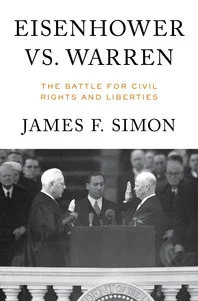Eisenhower vs Warren: The Battle for Civil Rights and Liberties by James Simon
/Eisenhower vs Warren: The Battle for Civil Rights and Liberties
by James Simon
WW Norton, 2018
Legal historian James Simon adds to his shelf of first-rate books with his latest, Eisenhower vs Warren: The Battle for Civil Rights and Liberties, a detailed, fine-grained study of the tense relationship between President Eisenhower and his most famous appointee, Supreme Court Chief Justice Earl Warren. The stage is America of the 1950s and early '60s, an era of outward bourgeoise prosperity overlaying increasingly molten social and racial angers, and of course the flashpoint was the historic desegregation verdict handed down unanimously by the Court in Brown vs. the Board of Education.
The clash of wills at the center of the story has always been easy to reduce to caricature, and Simon is keenly aware of this. Until comparatively recently, the standard view of Eisenhower was of a sleepy, smiling placeholder of a president, the exact temperamental opposite of a forceful, magnetic figure like Warren. Eisenhower's reaction to Brown and other activist rulings by the Warren Court seem to feed into this caricature; despite how accurately he might have read the public mood, the President was extremely reluctant to weigh in publicly from the most powerful podium in the Western world. While Warren was legislating the desegregation of American schools, Eisenhower's silence (or worse, grudging acknowledgment that Brown was now, in fact, the law of the land) could be seen – indeed, has been seen, by more than a few historians – as tacit disapproval.
Simon cites possible reasons for this, including the chance that Eisenhower retained a “residual racism, rooted in his segregated upbringing and his career in the segregated military.” But the strongest impression left by Eisenhower vs Warren is one of uncomplicated contradiction: the Eisenhower who emerges from these pages is much more in line with recent re-assessments of the man and his time in office. “Once Eisenhower's papers could be studied at his presidential library in Abilene, Kansas, scholars realized that he was neither a passive nor a dithering president, as he sometimes appeared in press conferences,” Simon writes. “To the contrary, he was an extremely intelligent, able, calculating chief executive who cast a cold, sober eye on what was possible to accomplish in his complicated job.”
Eisenhower's years as leader of the Allied forces during the Second World War had trained up in him a deeply-rooted appreciation for conciliation, for the long-view strategy of the “middle way” approach to command, and these instincts were alert to the strength of Southern opposition to Brown. But as Simon skillfully demonstrates, Eisenhower was far from inert on the subject of racial reform; “In areas where he could wield federal power without fear of southern defiance,” Simon writes, “he did so decisively.” Even an abbreviated list is fairly impressive:
Without fanfare or violence, he desegregated the military, Veterans Administration hospitals, naval yards, and schools on military bases in the South, and the public schools and restaurants in the District of Columbia. He strongly endorsed equal political rights for black Americans, pushing aggressively for voting rights provisions in the Civil Rights Acts of 1957 and 1960, and proudly signed both statutes, the first civil rights legislation since Reconstruction.
“Although Eisenhower did not use his bully pulpit to support Brown,” Simon concludes, “his actions certainly did.”
Warren, too, is written as intriguingly complicated, although Simon's characterization of how contemporaries viewed the Chief Justice – as “the very personification of honesty, decency, and fairness” – tends to overlook the substantial portion of the country that had every bit as low an opinion of the man as Eisenhower himself had. In most of Simon's earlier works studying the relationship between the Executive and the Judiciary, the Presidents in question tend to come across as the lesser creatures – but not in this case. Mixed signals on Brown vs the Board of Education notwithstanding, this is Ike's book from first to last.
Steve Donoghue was a founding editor of Open Letters Monthly. His book criticism has appeared in the Boston Globe, the Wall Street Journal, and the American Conservative. He writes regularly for the National, the Washington Post, the Vineyard Gazette, and the Christian Science Monitor. His website is http://www.stevedonoghue.com
